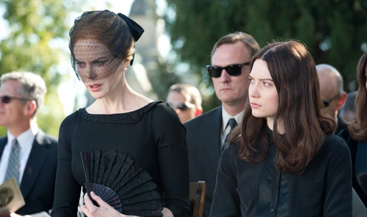Movie Review: Stoker
By Matthew Huntley
March 12, 2013
BoxOfficeProphets.com

The story begins with the funeral of Richard Stoker (Dermot Mulroney), a successful architect allegedly killed in a car accident. He’s survived by his distant and self-obsessed wife, Evelyn (Nicole Kidman), and their reclusive, withdrawn daughter, India (Mia Wasikowska). Richard also had a brother, the enigmatic Charles (Matthew Goode), who shows up to the funeral out of the blue and incites India to ask why nobody ever told her she had an uncle.
Evelyn and India now live alone in their dreary, remote mansion, which itself looks like it’s in a state of arrested development (the setting for Stoker could conceivably be any era from the past 60 years). Despite the family’s wealth, their lifestyle is not especially modern, and neither is India, who spends most of her time engaging with the environment around her - running in fields, climbing trees and playing the piano. She also searches for the same birthday present her father gives her every year - a pair of black and white saddle shoes - but since Richard died on her 18th birthday, she doesn’t know if she’ll be getting them, and so she makes a circle out of previous 17 pair on her bed and curls up inside it.
At the funeral reception, Evelyn tells India that Charles will be staying with them indefinitely. His incessant gaze and lurking about causes India to grow increasingly fixated on him. Clearly, the movie wants us to wonder whether India is attracted to him sexually. Or perhaps it’s just the idea of Charles she finds alluring. After all, he’s lean, confident and direct, and his looks remind India of her father. Or it could be she’s just suspicious of Charles’ real intentions - toward her, toward her mother. What exactly is Charles after? And what does he mean by cooking them dinner, or taking Evelyn on day trips, or walking the grounds and digging holes, or suddenly showing up at India’s school uninvited?
We ask these and other questions, and for a time we’re interested in the answers, but once the movie begins to reveal its true self, we grow disappointed because it descends into a mostly standard thriller where violence ensues and the body count begins to rise. The problem, I think, rests not with the direction or even with the way the movie is made, but rather in Wentworth Miller’s screenplay. Director Chan-wook Park (Oldboy) lends the film a distinct and lively visual and aural style, utilizing all of his practical resources so there’s something always something interesting for us to see or hear. But there’s not always something interesting to think about or feel. And even though they come across as complex, there’s little substance behind the characters to make us care about or appreciate them, especially during the film’s intentionally shocking moments.
Let me give you an example. Given India’s dark and secluded nature, not to mention pale complexion, it’s no surprise she’s a social outcast at school. She wears long sleeved-blouses, long skirts and does her best to avoid those around her. This inevitably draws the harassment of a group of boys who call her Stroker. The idea of this we can believe, but not the execution, which is so forced and fabricated, we’d have trouble believing it in any movie. The bullies are such stock movie characters we simply tune them out in disbelief. And because the credibility of these scenes ends up being so vacuous, when India finally does fight back with a sharp pencil, it doesn’t really matter to us, and not just because we know it’s coming, but because it’s so dumbed down and conventional. Had the bully characters been developed or made original, and India’s behavior believable, the consequences of these scenes might have taken on a greater meaning.
And even though Stoker is being advertised as a “psychological thriller,” its psychological aspects are mostly superficial and predictable. We know there’s sexual chemistry between Evelyn and Charles, and we probably know their relationship is making India jealous, or perhaps envious; and we know there are unresolved issues between India and her mother. But Miller’s screenplay doesn’t bother going beyond what we already know; it simply reiterates things.
Another example: at the funeral reception, one of the maids says that with India’s father now gone, the little girl only has her mother to look after her, and then comments, “It’s more like the other way around.” Aren’t little pieces of dialogue like this obvious to the viewer? We can see Evelyn is an unfit mother, so why does the script go out of its way to mention it? It gives little credit to the audience and too often feels the need to spell things out explicitly. Deep down, I don’t think it even cares about being a psychological thriller as much as a violent and gruesome one.
Stoker is a case of having the right technical ingredients and a talented cast but not a substantive story to connect them. I walked away from it somewhat stimulated by its visual and aural qualities but didn’t care about its human elements, which is what really counts.